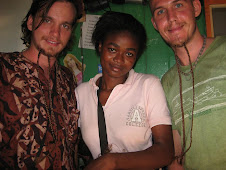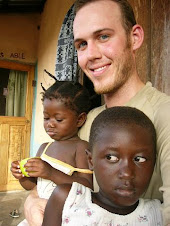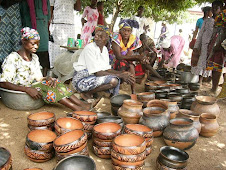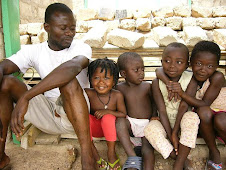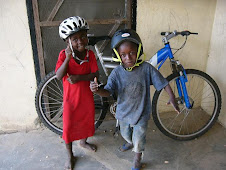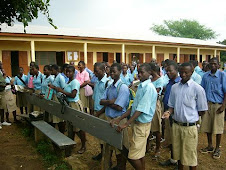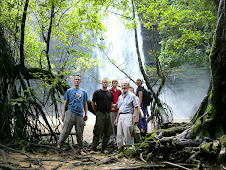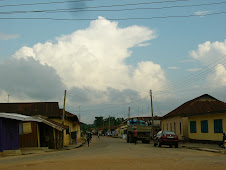Thanks to all who continue to keep me informed of the outside world and send me positive energies and encouragement. As for mail, thanks to all who have sent me mail, although I haven't received it yet. I have joined some other PCV's in the area in using a post office box in Bolga, where I'll be able to check it more often, and hopefully, mail will be delivered faster. If you send something to the Peace Corps address, it will still get to me, it will just take some time. The below address is fine to send letters and packages. Thanks!!
Toby Koy
PO Box 743
Bolgatanga, UER
Ghana, West Africa
I'll let you know when and if I get something, that way you'll know it got to me.
I've been doing pretty good, here. The first week of classes at my school has just ended, but there is still plenty of organizing to do, and it will take some time for me to get the flow of the place. I'll address the topic of school at a later time.
The money in Ghana is called the Cedi, pronounced like "CD." Just last year the money was revalued, to stabilize the economy I suppose, and now there are two ways to talk about money: The old cedi and the new Ghana Cedi. The new GH Cedi is about equal to the dollar, and 1 GHC is equal to 10,000 old cedis. They have all new money, nice color coded bills and shiny coins, but half the time, people still refer to prices using the old numbers. In the market, the woman tells me that the heads of garlic are 3,000 each. She means 30 pesewas (or 30 cents). Since I buy a lot of things that are less than a GH Cedi, I often convert back and forth, and I usually don't get confused, many people do, it's new for everyone. People say "tousand" which means 10 pesewas/cents. It pays to have an idea of the approximate cost of something, so if the vender says "3" you will be able to guess if he/she means 3,000 (30 pesewas) or GHC 3.00.
Here are some common costs of things I buy: pure water satchet 500ml: 500 cedi (5 pesewas), freshtaste-like a fruity freezepop: 5 pesewas, corn roasted over coals by street vender: 20 pesewas (the corn isn't the sweet corn like in the states, but It's still pretty good), FanYogo-strawberry yogurt frozen treat: 40 pesewas, bag of ground-nut paste(peanut butter) 1/2 cup: 50 pesewas, dry local rice about 500 ml: 80 pesewas, big loaf of sweet bread: 1 GH Cedi, pint jar of fruit jam: GHC 2.50. A lot of food is not very expensive here, just the imported foods like the jam are more costly. Local produce and things made here(like the ground-nut paste) are pretty cheap.
In the market, and at food stands, you often buy food by cost, rather than volume. For instance, you wouldn't say, "Give me 3 tomatoes," you would say, "Give me tomatoes 2,000". Vendors will arrange there things in little piles, and then tell you the cost of each pile. Often they will have two or three sizes. With bulk things like rice or flour, they have different cups or cans and a price for each. When you buy food at a market, they will often put it in a bag for you, no matter what it is. They even put oil, honey, or kerosine in a plastic bag if you buy it. The plastic bag really is the only container that is used here.
People sell lots of stuff off their heads. Carrying things on your head here is standard, so it's not uncommon to see someone with a huge bowl of some product on their head. Sometimes it's a box with clear sides so you can see the food, or a bucket with a lid. It is impressive that people are able to balance heavy things so well, and the women (especially) all have good posture because they often carry heavy things on their heads.
As for me, I cook most of my own food now. I'm happy with that, even though ingredients are limited. I can always find garlic, onions, tomatoes and okra. Also dried hot peppers and a few spices. I mostly eat rice, pasta or bread with a veggie stew. The other common starch is yams and cocoyams. I cook them like potatoes, and it work out fine. I like to cook and I'm not picky, so I'll survive.
I'm tired of writing, so I'll just give you some more pictures. If you have topics you want me to cover about life in Ghana, or you have questions, feel free to comment, or email me. I can be sort of scatterbrained sometimes, and I don't know how well I'm doing at giving an accurate picture of what it's like here.
To all my friends and family: I miss you.
Love,
Toby
Saturday, September 20, 2008
Tuesday, September 9, 2008
photos
I've added a few more photos at the end of this album on facebook.
There are some of my house and kids, and the swearing-in ceremony. I'm doing well, getting ready for classes to start. I'll ramble more later, I've been on the computer for a while now...
love,
Toby
There are some of my house and kids, and the swearing-in ceremony. I'm doing well, getting ready for classes to start. I'll ramble more later, I've been on the computer for a while now...
love,
Toby
Wednesday, September 3, 2008
Send me a care package!
If you miss me, then you'll want to send me a care package! Just kidding, only send me stuff if you want to. Feel free to send letters or anything as well, but don't spend too much on postage, I hear the flat rate boxes are the best deal. If you want to send me snacks, send stuff that can survive rough handling and temperature changes, and put stuff in ziplock bags. swedish fish, dried fruit, cliff bars, powdered cheese, and cookies are some of the things I crave. Send packages to the PC office, and they should find their way to me eventually. Thanks in advance!
love, Toby
Toby Koy c/o
Peace Corps Ghana
PO Box 5796
Accra North, Ghana
West Africa
love, Toby
Toby Koy c/o
Peace Corps Ghana
PO Box 5796
Accra North, Ghana
West Africa
PCV at last
Well, training is finally over and I am officially a Peace Corps Volunteer! There was a big ceremony in which our trainers presented me with a certificate and we took the oath of service. It was a pretty big deal and I felt pretty good. My host family, my father, mother, and brother Michael and sister Nancy came to see me. My family had a great outfit made for me that matched with Michael's and we both wore them at the ceremony. They also gave me an outfit in the northern style. I thanked them and said goodbye, then moved out. It was sad to leave after 2 months of living with them, but I was also excited to finally get to my site and make a place for myself that is truly my own.
I took my time traveling to site, spending a night in Kumasi and then Tamale, at the Sub-offices there. Traveling with the puppy wasn't so bad. On the busses, she stayed in her basket on my lap and mostly slept. She did well on the leash, too. She isn't house trained, and I had to clean up after her on a few occasions, but overall, it was not as difficult as I anticipated traveling 15 hrs with a 2 month old puppy. I was also lucky that there were people traveling the same way who helped me look after her.
The past week I've been getting to know the people in my community and working on my room and house. I've spent the most time in the kitchen, I miss the Phoenix kitchen, and I've been equipping myself as much as I can to be able to cook whatever I want. I worked with the local carpenter to make a free-standing shelf unit to store my food, pots, pans, and dishes, and I brought in a table to work on. I have a counter with a good sink and a 3-burner propane stove, but no running water or electricity. It means that I need to start cooking supper around 5 pm if I want to see what I'm doing, since the sun sets around 6:30pm. I have a kerosene lamp and torches(flashlights) to fill in the gaps, and I take bucket baths in the dark.
I've grown to like bathing (pronounce bath-ing) this way: take a bucket of water and pour some on your head from a smaller cup. Wash with soap all over, no need for shampoo, and then pour the rest of the water on yourself to rinse. The best part is when you've finished and there is still some water in the bucket, you raise the bucket and dump it on your head. Refreshing! And economical, since I usually have to fetch my own water from a borehole nearby my house. When It rains, I collect all I can off the roof, and I want to add gutters to my house to catch more. Just another project.
Eventually, when I have everything arraigned, I'll go around and take pictures of my house to make a "virtual tour" for you all. It might take a while, because my camera batteries are currently dead. I can charge them and other electrical things at a friend's house. I've got a few weeks until the students arrive and classes at my school begin, and then I'll actually have to teach high school! Until then, I've got plenty to do, organizing my new life. I miss the familiarity of things at home, and mostly, the people. I hope you are all doing well. Email me and tell me what's new in your life. Remember, I'm sort of cut off, so even mundane things are exciting to me.
I'll try to update about weekly, although anything change here. I'm on Ghana time. Know that I am doing well, and thinking of you, my friends and family, often.
Love, Toby
I took my time traveling to site, spending a night in Kumasi and then Tamale, at the Sub-offices there. Traveling with the puppy wasn't so bad. On the busses, she stayed in her basket on my lap and mostly slept. She did well on the leash, too. She isn't house trained, and I had to clean up after her on a few occasions, but overall, it was not as difficult as I anticipated traveling 15 hrs with a 2 month old puppy. I was also lucky that there were people traveling the same way who helped me look after her.
The past week I've been getting to know the people in my community and working on my room and house. I've spent the most time in the kitchen, I miss the Phoenix kitchen, and I've been equipping myself as much as I can to be able to cook whatever I want. I worked with the local carpenter to make a free-standing shelf unit to store my food, pots, pans, and dishes, and I brought in a table to work on. I have a counter with a good sink and a 3-burner propane stove, but no running water or electricity. It means that I need to start cooking supper around 5 pm if I want to see what I'm doing, since the sun sets around 6:30pm. I have a kerosene lamp and torches(flashlights) to fill in the gaps, and I take bucket baths in the dark.
I've grown to like bathing (pronounce bath-ing) this way: take a bucket of water and pour some on your head from a smaller cup. Wash with soap all over, no need for shampoo, and then pour the rest of the water on yourself to rinse. The best part is when you've finished and there is still some water in the bucket, you raise the bucket and dump it on your head. Refreshing! And economical, since I usually have to fetch my own water from a borehole nearby my house. When It rains, I collect all I can off the roof, and I want to add gutters to my house to catch more. Just another project.
Eventually, when I have everything arraigned, I'll go around and take pictures of my house to make a "virtual tour" for you all. It might take a while, because my camera batteries are currently dead. I can charge them and other electrical things at a friend's house. I've got a few weeks until the students arrive and classes at my school begin, and then I'll actually have to teach high school! Until then, I've got plenty to do, organizing my new life. I miss the familiarity of things at home, and mostly, the people. I hope you are all doing well. Email me and tell me what's new in your life. Remember, I'm sort of cut off, so even mundane things are exciting to me.
I'll try to update about weekly, although anything change here. I'm on Ghana time. Know that I am doing well, and thinking of you, my friends and family, often.
Love, Toby
Wednesday, August 13, 2008
Gurune
Training is almost over, I am spending most of our time now studying language or just hanging out. I'm not worried about the language assessment tomorrow, I've been working with my trainer, Mark, for the past two months, and I think I have a pretty good basic understanding of Gurune. I can do greetings and personal introductions. I can ask and answer questions about location, directions, food, health, family, and time, somewhat. I even know a children's song. The tune is close to friere jacques.
in Gurune (Frafra):
N soh la n mma, (x2)
Ya gihire me? (x2)
Duusid la daane mam. (x2)
Vii, Voo, Vii (x2)
in English:
Father and Mother,
Are you sleeping?
Mosquitos are bothering me.
Vii, Voo, Vii (the sound of mosquitos)
It's fitting to the culture and the environment, and I think I'll sing it for the swearing in ceremony we have coming up to show everyone how much I've learned. You can all sing it too, and teach it to your children and your students! I'm specifically thinking of my friends and family members who work at day cares. Incedentally, mosquitos are not bothering me. I take my malaria prophylaxis medicine every week and sleep under a treated net, so don't worry!
Love,
Toby
in Gurune (Frafra):
N soh la n mma, (x2)
Ya gihire me? (x2)
Duusid la daane mam. (x2)
Vii, Voo, Vii (x2)
in English:
Father and Mother,
Are you sleeping?
Mosquitos are bothering me.
Vii, Voo, Vii (the sound of mosquitos)
It's fitting to the culture and the environment, and I think I'll sing it for the swearing in ceremony we have coming up to show everyone how much I've learned. You can all sing it too, and teach it to your children and your students! I'm specifically thinking of my friends and family members who work at day cares. Incedentally, mosquitos are not bothering me. I take my malaria prophylaxis medicine every week and sleep under a treated net, so don't worry!
Love,
Toby
Wednesday, August 6, 2008
Sirigu: first impressions
My site is so nice! I spent the last few days getting to know the place I will live and work for the next two years. The community of Sirigu is very small and the area it's in is very rural. The countryside is pretty open, it's savanna in the north, but not like in the Lion King. There are trees here and there, a variety of shrubs and grasses, and lots of grazing animals. The land is flat, and the hills in the distance are Burkina Faso, or so I'm told. The people here are almost all subsistence farmers, growing millet, soy, and other crops. Many still live in very traditional mud compound-houses with geometric designs painted on them with natural red, black and white dyes. Photos to come. There are animals everywhere: chickens, guinea hens, pigs, goats, sheep, cows, donkeys, horse(I only saw one), dogs and cats.
The village itself has maybe a few hundred people living in it, and there are some small shops and a market every 3 days. It is on a rough dirt road that connects it to other small villages in the area, and to larger towns nearby. There is also a stream that runs past the village and the road crosses it on the way into/out of town. There is an uncompleted bridge over the stream, so you actually have to drive through the water. It's not too big of a deal when it hasn't rained in a few days-the stream may only be a few feet wide, but right after a rain the stream gets big-up to 15-20 feet across. It can be a problem, because when it rains here, it rains a lot all at once. The water runs off fast, and the ground absorbs it so it only takes a day or so to dry out. There aren't too many cars around, taxis only really come through one at a time. Here in the north, everyone has a motorcycle or a bicycle. I'm excited to get a bike and start riding.
The house I'll be living in is just near the school. Sirigu Senior High School is outside of the village, a 10 minute walk cross country, but there are paths. The building is a nice finished bungalow that I share with another teacher and the headmaster part-time. I have my own room and bathroom, and share the living room and kitchen, although I don't think the other guys cook much. I'm excited about setting up my own kitchen and cooking for myself. At the site, I'm replacing another volunteer who just left after two years of teaching there. Jason left me some good stuff, too: a bookshelf full of books, a nice bike with a bent rear axle(I'll get it fixed...), a stove, plenty of pots, pans, plates, and silverware, and other random items, including a small solar panel set-up. The latter could be useful, because there is currently no electricity to the building. It is wired and there are ceiling fans and light fixtures there, so if they ever actually connect us, we'll be fine. They say it will happen in the next two months, but I get the feeling that they have been saying that for a while.
Everyone I've met has been very nice and helpful, especially my counterpart, Bismark. He showed me around town, introduced me to the chief, and other important community members, and welcomed me into his home. I ate most of my meals with him, and got to know his wife and two young daughters. Photos to come.
I've got two more weeks of training and then I will finally get to move up to Sirigu permanently. It will be a lot of work, but I'm excited to make the place my home, and become a part of the community. I'll keep working on language, because almost no one there speaks english.
Love,
Toby
The village itself has maybe a few hundred people living in it, and there are some small shops and a market every 3 days. It is on a rough dirt road that connects it to other small villages in the area, and to larger towns nearby. There is also a stream that runs past the village and the road crosses it on the way into/out of town. There is an uncompleted bridge over the stream, so you actually have to drive through the water. It's not too big of a deal when it hasn't rained in a few days-the stream may only be a few feet wide, but right after a rain the stream gets big-up to 15-20 feet across. It can be a problem, because when it rains here, it rains a lot all at once. The water runs off fast, and the ground absorbs it so it only takes a day or so to dry out. There aren't too many cars around, taxis only really come through one at a time. Here in the north, everyone has a motorcycle or a bicycle. I'm excited to get a bike and start riding.
The house I'll be living in is just near the school. Sirigu Senior High School is outside of the village, a 10 minute walk cross country, but there are paths. The building is a nice finished bungalow that I share with another teacher and the headmaster part-time. I have my own room and bathroom, and share the living room and kitchen, although I don't think the other guys cook much. I'm excited about setting up my own kitchen and cooking for myself. At the site, I'm replacing another volunteer who just left after two years of teaching there. Jason left me some good stuff, too: a bookshelf full of books, a nice bike with a bent rear axle(I'll get it fixed...), a stove, plenty of pots, pans, plates, and silverware, and other random items, including a small solar panel set-up. The latter could be useful, because there is currently no electricity to the building. It is wired and there are ceiling fans and light fixtures there, so if they ever actually connect us, we'll be fine. They say it will happen in the next two months, but I get the feeling that they have been saying that for a while.
Everyone I've met has been very nice and helpful, especially my counterpart, Bismark. He showed me around town, introduced me to the chief, and other important community members, and welcomed me into his home. I ate most of my meals with him, and got to know his wife and two young daughters. Photos to come.
I've got two more weeks of training and then I will finally get to move up to Sirigu permanently. It will be a lot of work, but I'm excited to make the place my home, and become a part of the community. I'll keep working on language, because almost no one there speaks english.
Love,
Toby
Friday, August 1, 2008
Puppy and Site Visit
My host family gave me a puppy! The puppy was just hanging around the house and no one was taking care of it, so I started to. I think it will be alright, and there are other people to help me take care of her at homestay, and I think I can work it out at site. The other thing is that she doesn't need as much care as you'd expect. This is Ghana after all, and people here don't treat their animals the same. During the day, she mostly sleeps or entertains herself, playing with whatever or whoever is around. I feed her when I eat, and she eats what I eat. She sleeps outside under a bench or on a piece of cloth or plastic or nothing. I think because she was taken away from the mother at such a young age, she has learned to survive by herself earlier than is usual for an American dog.
I wasn't neccessarily planning on getting a dog here, but I knew that it was a possibility. I'll worry about what do to with the dog at the end of my service when it comes. For now I am excited and hesitant. I know I have seen the best dog trainer at work, my dad, but I still worry that I won't have enough time or won't do a good job training her of raising her. I guess that's a parent/pet owner thing to feel. anyway, I call her Akramine-baa, which means little dog in twi. I'll give her more names as we go. She's really small- i'd guess about 6 weeks old now, but I don't know. She is very independent, and sleeps outside and takes care of her self most of the time. I feed her and play with her when I can, and she mostly tries to play-fight with my hand. Also, she has fleas like crazy. I gave her a bath, but I can't compete with them. There are very limited veteranary services here, people don't really keep animals as pets, just as farm animals, even dogs and cats. I'm asking my parents to send some frontline dog stuff to me.
Right now i'm in the Kumasi Sub Office. It's a really nice spot where PCV's can rest and regroup, or hang out. It's just a rest stop while I travel to Sirigu for my site visit. It will be the first time that I'll get to really see what my site will be like. I'll get to visit my school, see the house I'll be living in, and what good stuff the previous volunteer, Jason, left for me. I'll get to find out about my community, talk to the people in Gurune, and get a look at the land. The North is totally different than the South, they say. I already met the Headmaster of my school, James, and another teacher there who will be my contact person, Bismark. They are both very nice and laid back. We had a 2 day workshop where we got to know one another and talked about what it would be like at site. Now Bismark and I are traveling back up to Sirigu, and I'll spend about 5 days there before I have to go back for the last two weeks of training in Kukurantumi.
Tomorrow, we are meeting at 5am to try to get the early bus to Bolgatanga. There will be a line, and the bus will leave around 6, as soon as it's full. If we miss it, we'll have to take the second bus, but it could leave anywhere from 7 to 10, depending on when it fills. The ride is around 9 hours, so we want as early a start as possible. We are taking a bigger bus, not a trotro, so it will be more comfortable, and I'll get some reading (and hopefully some sleeping) done.
I'll let you know all about my site very soon.
love,
Toby
I wasn't neccessarily planning on getting a dog here, but I knew that it was a possibility. I'll worry about what do to with the dog at the end of my service when it comes. For now I am excited and hesitant. I know I have seen the best dog trainer at work, my dad, but I still worry that I won't have enough time or won't do a good job training her of raising her. I guess that's a parent/pet owner thing to feel. anyway, I call her Akramine-baa, which means little dog in twi. I'll give her more names as we go. She's really small- i'd guess about 6 weeks old now, but I don't know. She is very independent, and sleeps outside and takes care of her self most of the time. I feed her and play with her when I can, and she mostly tries to play-fight with my hand. Also, she has fleas like crazy. I gave her a bath, but I can't compete with them. There are very limited veteranary services here, people don't really keep animals as pets, just as farm animals, even dogs and cats. I'm asking my parents to send some frontline dog stuff to me.
Right now i'm in the Kumasi Sub Office. It's a really nice spot where PCV's can rest and regroup, or hang out. It's just a rest stop while I travel to Sirigu for my site visit. It will be the first time that I'll get to really see what my site will be like. I'll get to visit my school, see the house I'll be living in, and what good stuff the previous volunteer, Jason, left for me. I'll get to find out about my community, talk to the people in Gurune, and get a look at the land. The North is totally different than the South, they say. I already met the Headmaster of my school, James, and another teacher there who will be my contact person, Bismark. They are both very nice and laid back. We had a 2 day workshop where we got to know one another and talked about what it would be like at site. Now Bismark and I are traveling back up to Sirigu, and I'll spend about 5 days there before I have to go back for the last two weeks of training in Kukurantumi.
Tomorrow, we are meeting at 5am to try to get the early bus to Bolgatanga. There will be a line, and the bus will leave around 6, as soon as it's full. If we miss it, we'll have to take the second bus, but it could leave anywhere from 7 to 10, depending on when it fills. The ride is around 9 hours, so we want as early a start as possible. We are taking a bigger bus, not a trotro, so it will be more comfortable, and I'll get some reading (and hopefully some sleeping) done.
I'll let you know all about my site very soon.
love,
Toby
Subscribe to:
Posts (Atom)

